SH6053 Assignment: Analysis of Dementia in Health and Social Care
VerifiedAdded on 2022/09/11
|17
|4784
|15
Report
AI Summary
This report presents a comprehensive analysis of a case study involving an elderly patient, Alias Thompson, diagnosed with Alzheimer's disease. The report begins with an introduction that provides an overview of Alias's health and social history, including her medical background, family dynamics, and challenges related to her condition. A literature review explores socio-economic, cultural, and ethnic factors influencing dementia, highlighting disparities in diagnosis, treatment, and access to care, particularly within the Black community. The report examines service provisions specific to Alias's case, detailing the support systems available through the NHS and adult social services, including information sharing, daily living assistance, and access to relevant organizations. Finally, the report analyzes policy practices and care delivery structures related to Alias's situation, discussing the implications of these factors on the quality of life for dementia patients and their families, and suggests areas for improvement in service delivery and policy interventions. The report concludes with a summary of the key findings and recommendations for enhancing dementia care within the context of Alias's case.

Running head: CONTEMPORARY ISSUE IN HEALTH AND SOCIAL CARE
CONTEMPORARY ISSUE IN HEALTH AND SOCIAL CARE
Name of the student
Name of the university
Author notes
CONTEMPORARY ISSUE IN HEALTH AND SOCIAL CARE
Name of the student
Name of the university
Author notes
Paraphrase This Document
Need a fresh take? Get an instant paraphrase of this document with our AI Paraphraser
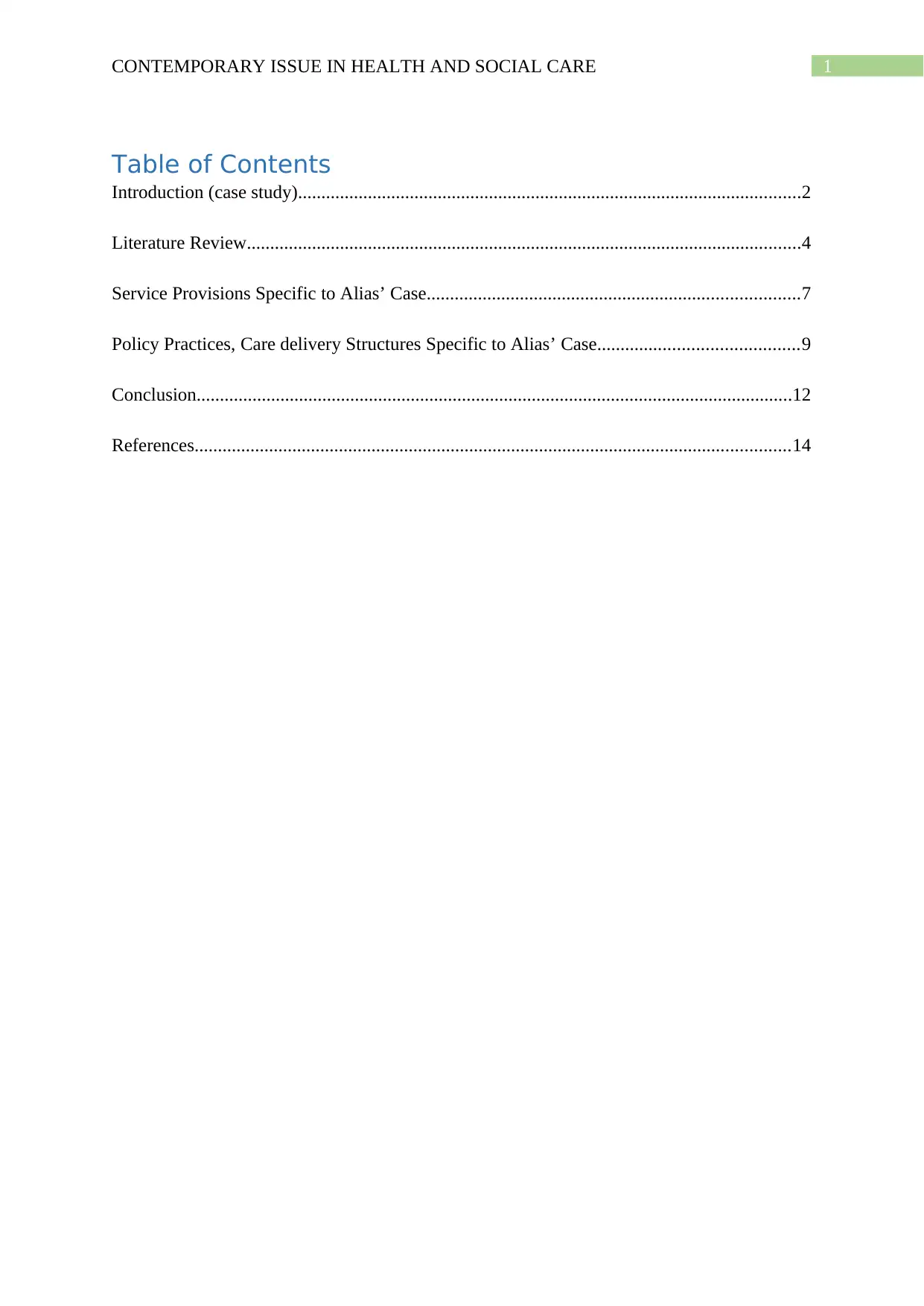
1CONTEMPORARY ISSUE IN HEALTH AND SOCIAL CARE
Table of Contents
Introduction (case study)............................................................................................................2
Literature Review.......................................................................................................................4
Service Provisions Specific to Alias’ Case................................................................................7
Policy Practices, Care delivery Structures Specific to Alias’ Case...........................................9
Conclusion................................................................................................................................12
References................................................................................................................................14
Table of Contents
Introduction (case study)............................................................................................................2
Literature Review.......................................................................................................................4
Service Provisions Specific to Alias’ Case................................................................................7
Policy Practices, Care delivery Structures Specific to Alias’ Case...........................................9
Conclusion................................................................................................................................12
References................................................................................................................................14
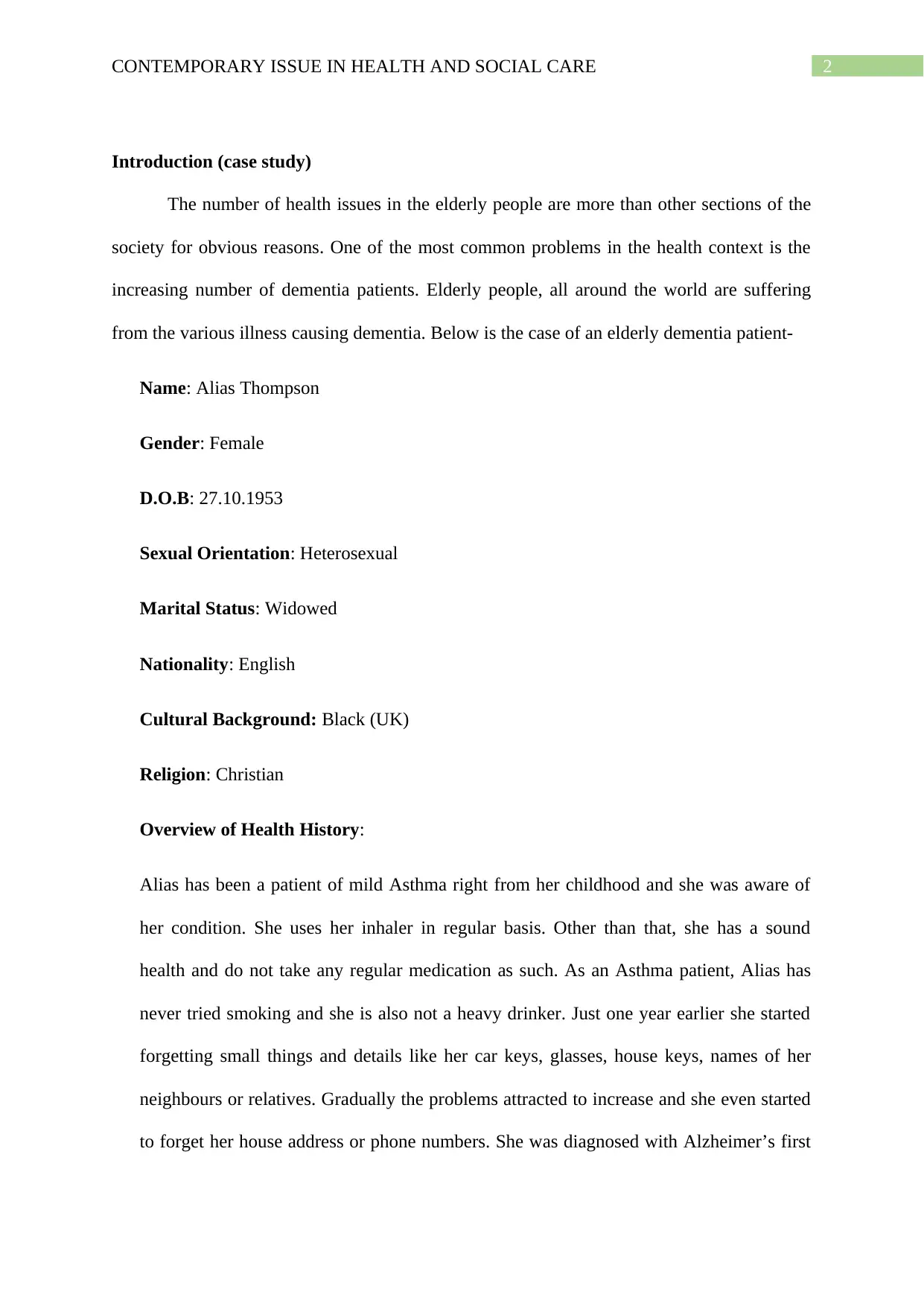
2CONTEMPORARY ISSUE IN HEALTH AND SOCIAL CARE
Introduction (case study)
The number of health issues in the elderly people are more than other sections of the
society for obvious reasons. One of the most common problems in the health context is the
increasing number of dementia patients. Elderly people, all around the world are suffering
from the various illness causing dementia. Below is the case of an elderly dementia patient-
Name: Alias Thompson
Gender: Female
D.O.B: 27.10.1953
Sexual Orientation: Heterosexual
Marital Status: Widowed
Nationality: English
Cultural Background: Black (UK)
Religion: Christian
Overview of Health History:
Alias has been a patient of mild Asthma right from her childhood and she was aware of
her condition. She uses her inhaler in regular basis. Other than that, she has a sound
health and do not take any regular medication as such. As an Asthma patient, Alias has
never tried smoking and she is also not a heavy drinker. Just one year earlier she started
forgetting small things and details like her car keys, glasses, house keys, names of her
neighbours or relatives. Gradually the problems attracted to increase and she even started
to forget her house address or phone numbers. She was diagnosed with Alzheimer’s first
Introduction (case study)
The number of health issues in the elderly people are more than other sections of the
society for obvious reasons. One of the most common problems in the health context is the
increasing number of dementia patients. Elderly people, all around the world are suffering
from the various illness causing dementia. Below is the case of an elderly dementia patient-
Name: Alias Thompson
Gender: Female
D.O.B: 27.10.1953
Sexual Orientation: Heterosexual
Marital Status: Widowed
Nationality: English
Cultural Background: Black (UK)
Religion: Christian
Overview of Health History:
Alias has been a patient of mild Asthma right from her childhood and she was aware of
her condition. She uses her inhaler in regular basis. Other than that, she has a sound
health and do not take any regular medication as such. As an Asthma patient, Alias has
never tried smoking and she is also not a heavy drinker. Just one year earlier she started
forgetting small things and details like her car keys, glasses, house keys, names of her
neighbours or relatives. Gradually the problems attracted to increase and she even started
to forget her house address or phone numbers. She was diagnosed with Alzheimer’s first
⊘ This is a preview!⊘
Do you want full access?
Subscribe today to unlock all pages.

Trusted by 1+ million students worldwide
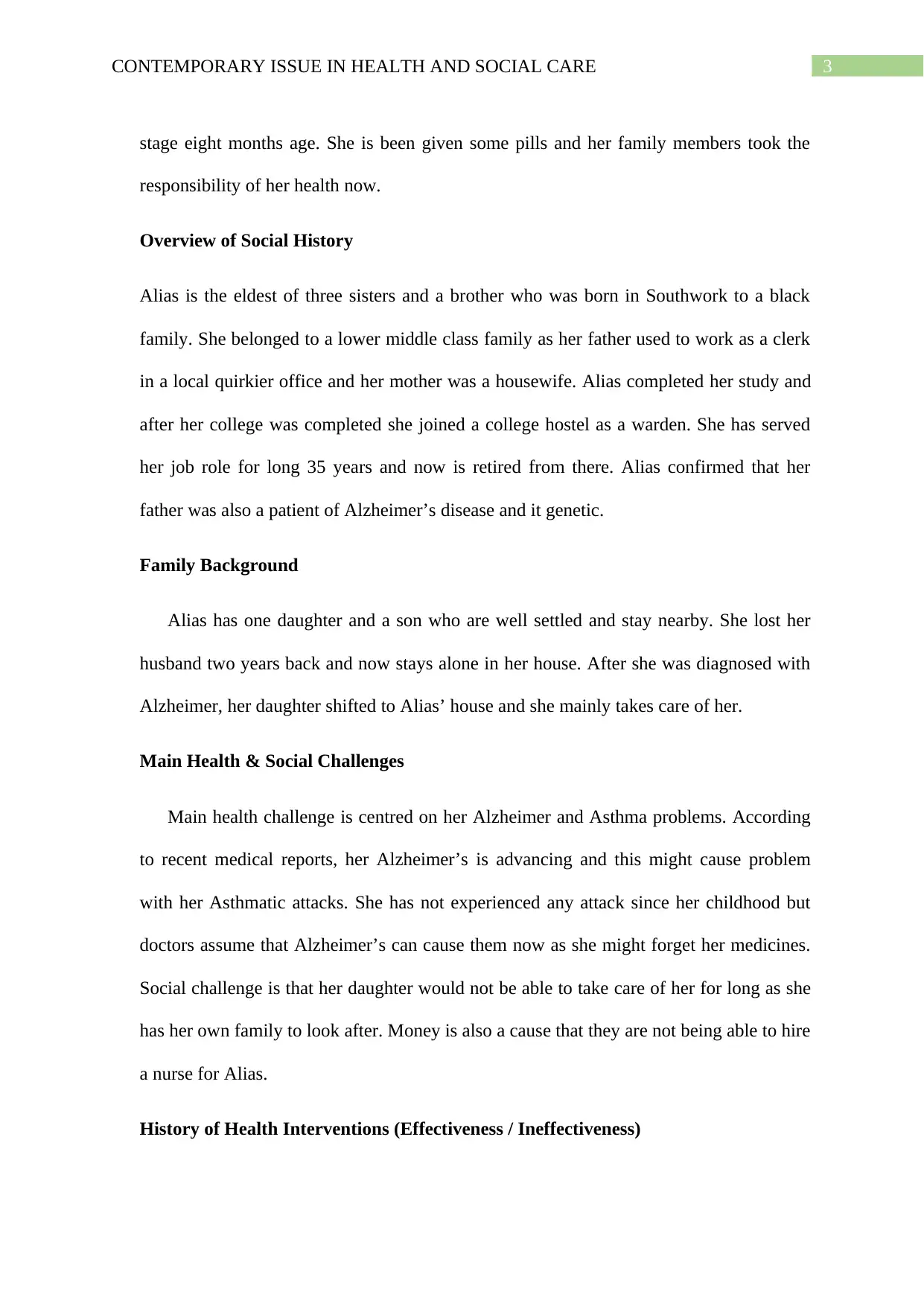
3CONTEMPORARY ISSUE IN HEALTH AND SOCIAL CARE
stage eight months age. She is been given some pills and her family members took the
responsibility of her health now.
Overview of Social History
Alias is the eldest of three sisters and a brother who was born in Southwork to a black
family. She belonged to a lower middle class family as her father used to work as a clerk
in a local quirkier office and her mother was a housewife. Alias completed her study and
after her college was completed she joined a college hostel as a warden. She has served
her job role for long 35 years and now is retired from there. Alias confirmed that her
father was also a patient of Alzheimer’s disease and it genetic.
Family Background
Alias has one daughter and a son who are well settled and stay nearby. She lost her
husband two years back and now stays alone in her house. After she was diagnosed with
Alzheimer, her daughter shifted to Alias’ house and she mainly takes care of her.
Main Health & Social Challenges
Main health challenge is centred on her Alzheimer and Asthma problems. According
to recent medical reports, her Alzheimer’s is advancing and this might cause problem
with her Asthmatic attacks. She has not experienced any attack since her childhood but
doctors assume that Alzheimer’s can cause them now as she might forget her medicines.
Social challenge is that her daughter would not be able to take care of her for long as she
has her own family to look after. Money is also a cause that they are not being able to hire
a nurse for Alias.
History of Health Interventions (Effectiveness / Ineffectiveness)
stage eight months age. She is been given some pills and her family members took the
responsibility of her health now.
Overview of Social History
Alias is the eldest of three sisters and a brother who was born in Southwork to a black
family. She belonged to a lower middle class family as her father used to work as a clerk
in a local quirkier office and her mother was a housewife. Alias completed her study and
after her college was completed she joined a college hostel as a warden. She has served
her job role for long 35 years and now is retired from there. Alias confirmed that her
father was also a patient of Alzheimer’s disease and it genetic.
Family Background
Alias has one daughter and a son who are well settled and stay nearby. She lost her
husband two years back and now stays alone in her house. After she was diagnosed with
Alzheimer, her daughter shifted to Alias’ house and she mainly takes care of her.
Main Health & Social Challenges
Main health challenge is centred on her Alzheimer and Asthma problems. According
to recent medical reports, her Alzheimer’s is advancing and this might cause problem
with her Asthmatic attacks. She has not experienced any attack since her childhood but
doctors assume that Alzheimer’s can cause them now as she might forget her medicines.
Social challenge is that her daughter would not be able to take care of her for long as she
has her own family to look after. Money is also a cause that they are not being able to hire
a nurse for Alias.
History of Health Interventions (Effectiveness / Ineffectiveness)
Paraphrase This Document
Need a fresh take? Get an instant paraphrase of this document with our AI Paraphraser
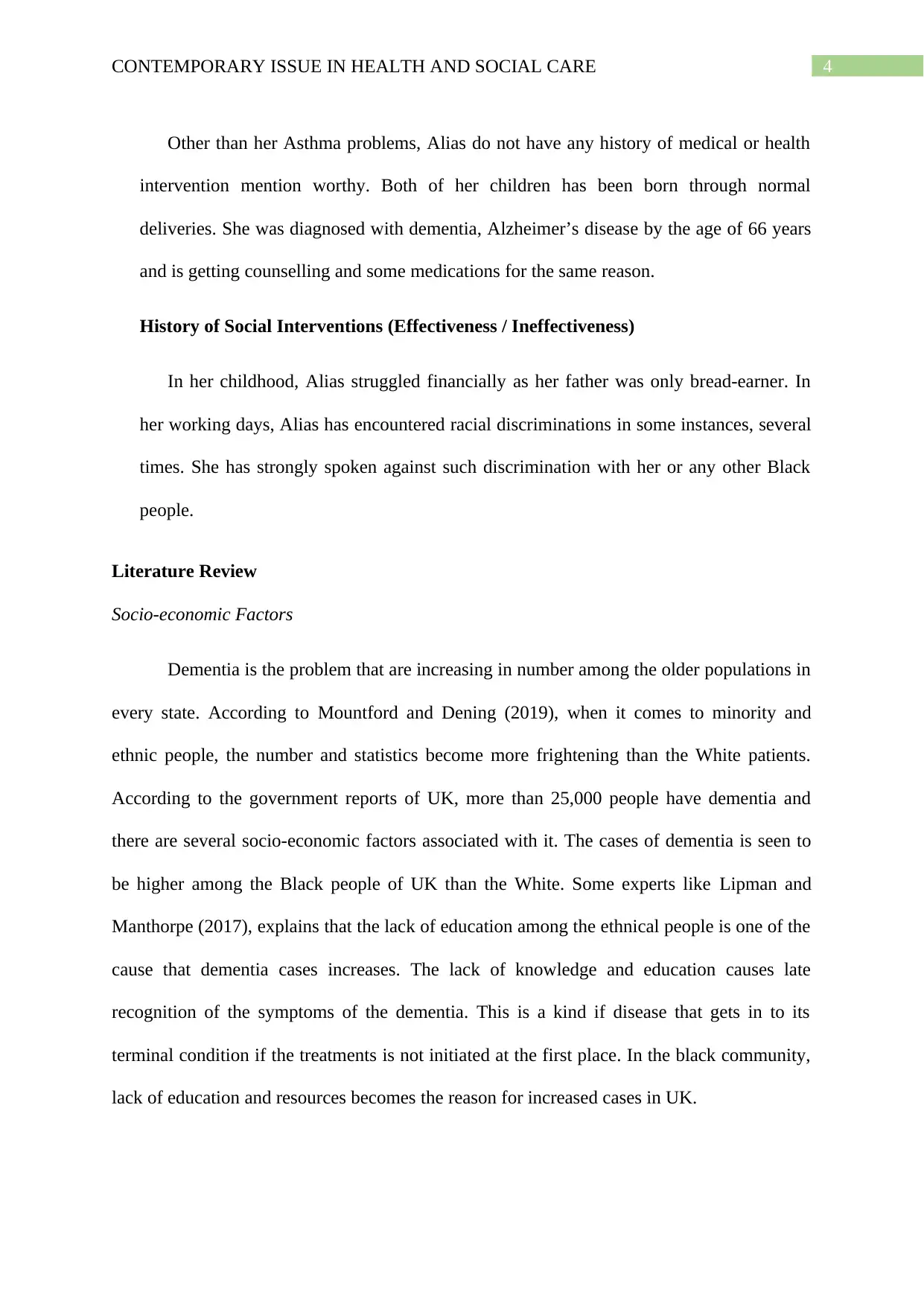
4CONTEMPORARY ISSUE IN HEALTH AND SOCIAL CARE
Other than her Asthma problems, Alias do not have any history of medical or health
intervention mention worthy. Both of her children has been born through normal
deliveries. She was diagnosed with dementia, Alzheimer’s disease by the age of 66 years
and is getting counselling and some medications for the same reason.
History of Social Interventions (Effectiveness / Ineffectiveness)
In her childhood, Alias struggled financially as her father was only bread-earner. In
her working days, Alias has encountered racial discriminations in some instances, several
times. She has strongly spoken against such discrimination with her or any other Black
people.
Literature Review
Socio-economic Factors
Dementia is the problem that are increasing in number among the older populations in
every state. According to Mountford and Dening (2019), when it comes to minority and
ethnic people, the number and statistics become more frightening than the White patients.
According to the government reports of UK, more than 25,000 people have dementia and
there are several socio-economic factors associated with it. The cases of dementia is seen to
be higher among the Black people of UK than the White. Some experts like Lipman and
Manthorpe (2017), explains that the lack of education among the ethnical people is one of the
cause that dementia cases increases. The lack of knowledge and education causes late
recognition of the symptoms of the dementia. This is a kind if disease that gets in to its
terminal condition if the treatments is not initiated at the first place. In the black community,
lack of education and resources becomes the reason for increased cases in UK.
Other than her Asthma problems, Alias do not have any history of medical or health
intervention mention worthy. Both of her children has been born through normal
deliveries. She was diagnosed with dementia, Alzheimer’s disease by the age of 66 years
and is getting counselling and some medications for the same reason.
History of Social Interventions (Effectiveness / Ineffectiveness)
In her childhood, Alias struggled financially as her father was only bread-earner. In
her working days, Alias has encountered racial discriminations in some instances, several
times. She has strongly spoken against such discrimination with her or any other Black
people.
Literature Review
Socio-economic Factors
Dementia is the problem that are increasing in number among the older populations in
every state. According to Mountford and Dening (2019), when it comes to minority and
ethnic people, the number and statistics become more frightening than the White patients.
According to the government reports of UK, more than 25,000 people have dementia and
there are several socio-economic factors associated with it. The cases of dementia is seen to
be higher among the Black people of UK than the White. Some experts like Lipman and
Manthorpe (2017), explains that the lack of education among the ethnical people is one of the
cause that dementia cases increases. The lack of knowledge and education causes late
recognition of the symptoms of the dementia. This is a kind if disease that gets in to its
terminal condition if the treatments is not initiated at the first place. In the black community,
lack of education and resources becomes the reason for increased cases in UK.
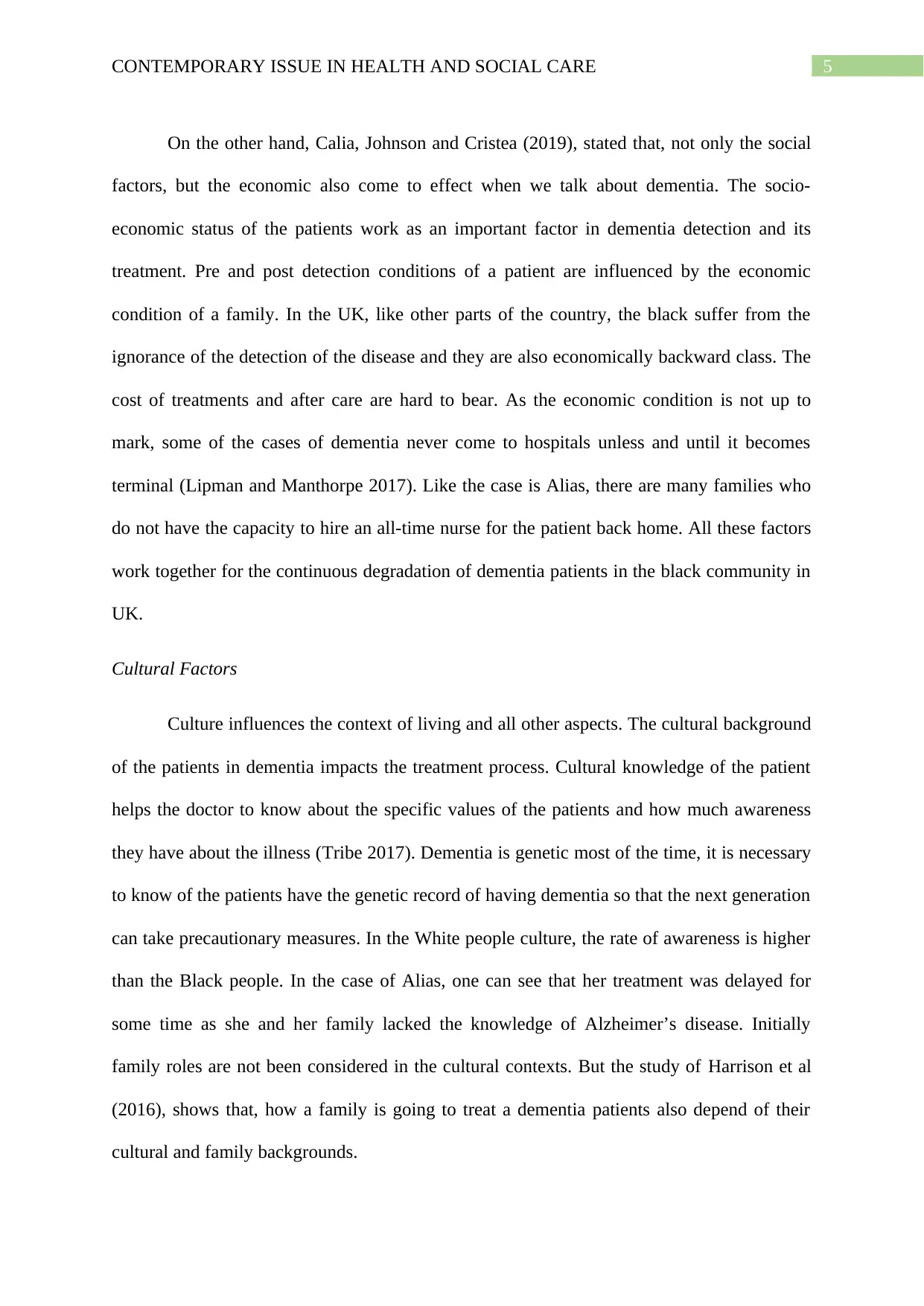
5CONTEMPORARY ISSUE IN HEALTH AND SOCIAL CARE
On the other hand, Calia, Johnson and Cristea (2019), stated that, not only the social
factors, but the economic also come to effect when we talk about dementia. The socio-
economic status of the patients work as an important factor in dementia detection and its
treatment. Pre and post detection conditions of a patient are influenced by the economic
condition of a family. In the UK, like other parts of the country, the black suffer from the
ignorance of the detection of the disease and they are also economically backward class. The
cost of treatments and after care are hard to bear. As the economic condition is not up to
mark, some of the cases of dementia never come to hospitals unless and until it becomes
terminal (Lipman and Manthorpe 2017). Like the case is Alias, there are many families who
do not have the capacity to hire an all-time nurse for the patient back home. All these factors
work together for the continuous degradation of dementia patients in the black community in
UK.
Cultural Factors
Culture influences the context of living and all other aspects. The cultural background
of the patients in dementia impacts the treatment process. Cultural knowledge of the patient
helps the doctor to know about the specific values of the patients and how much awareness
they have about the illness (Tribe 2017). Dementia is genetic most of the time, it is necessary
to know of the patients have the genetic record of having dementia so that the next generation
can take precautionary measures. In the White people culture, the rate of awareness is higher
than the Black people. In the case of Alias, one can see that her treatment was delayed for
some time as she and her family lacked the knowledge of Alzheimer’s disease. Initially
family roles are not been considered in the cultural contexts. But the study of Harrison et al
(2016), shows that, how a family is going to treat a dementia patients also depend of their
cultural and family backgrounds.
On the other hand, Calia, Johnson and Cristea (2019), stated that, not only the social
factors, but the economic also come to effect when we talk about dementia. The socio-
economic status of the patients work as an important factor in dementia detection and its
treatment. Pre and post detection conditions of a patient are influenced by the economic
condition of a family. In the UK, like other parts of the country, the black suffer from the
ignorance of the detection of the disease and they are also economically backward class. The
cost of treatments and after care are hard to bear. As the economic condition is not up to
mark, some of the cases of dementia never come to hospitals unless and until it becomes
terminal (Lipman and Manthorpe 2017). Like the case is Alias, there are many families who
do not have the capacity to hire an all-time nurse for the patient back home. All these factors
work together for the continuous degradation of dementia patients in the black community in
UK.
Cultural Factors
Culture influences the context of living and all other aspects. The cultural background
of the patients in dementia impacts the treatment process. Cultural knowledge of the patient
helps the doctor to know about the specific values of the patients and how much awareness
they have about the illness (Tribe 2017). Dementia is genetic most of the time, it is necessary
to know of the patients have the genetic record of having dementia so that the next generation
can take precautionary measures. In the White people culture, the rate of awareness is higher
than the Black people. In the case of Alias, one can see that her treatment was delayed for
some time as she and her family lacked the knowledge of Alzheimer’s disease. Initially
family roles are not been considered in the cultural contexts. But the study of Harrison et al
(2016), shows that, how a family is going to treat a dementia patients also depend of their
cultural and family backgrounds.
⊘ This is a preview!⊘
Do you want full access?
Subscribe today to unlock all pages.

Trusted by 1+ million students worldwide
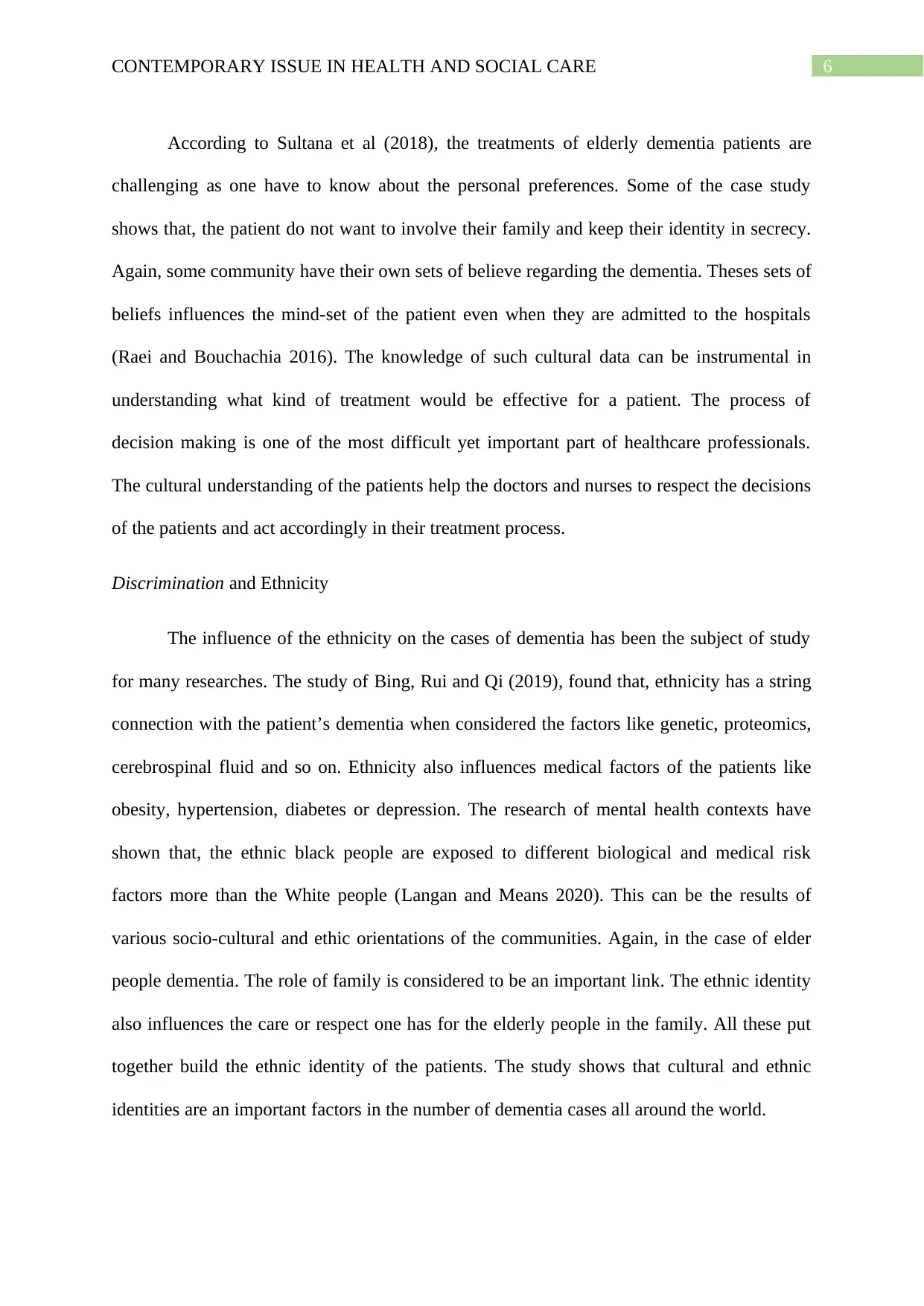
6CONTEMPORARY ISSUE IN HEALTH AND SOCIAL CARE
According to Sultana et al (2018), the treatments of elderly dementia patients are
challenging as one have to know about the personal preferences. Some of the case study
shows that, the patient do not want to involve their family and keep their identity in secrecy.
Again, some community have their own sets of believe regarding the dementia. Theses sets of
beliefs influences the mind-set of the patient even when they are admitted to the hospitals
(Raei and Bouchachia 2016). The knowledge of such cultural data can be instrumental in
understanding what kind of treatment would be effective for a patient. The process of
decision making is one of the most difficult yet important part of healthcare professionals.
The cultural understanding of the patients help the doctors and nurses to respect the decisions
of the patients and act accordingly in their treatment process.
Discrimination and Ethnicity
The influence of the ethnicity on the cases of dementia has been the subject of study
for many researches. The study of Bing, Rui and Qi (2019), found that, ethnicity has a string
connection with the patient’s dementia when considered the factors like genetic, proteomics,
cerebrospinal fluid and so on. Ethnicity also influences medical factors of the patients like
obesity, hypertension, diabetes or depression. The research of mental health contexts have
shown that, the ethnic black people are exposed to different biological and medical risk
factors more than the White people (Langan and Means 2020). This can be the results of
various socio-cultural and ethic orientations of the communities. Again, in the case of elder
people dementia. The role of family is considered to be an important link. The ethnic identity
also influences the care or respect one has for the elderly people in the family. All these put
together build the ethnic identity of the patients. The study shows that cultural and ethnic
identities are an important factors in the number of dementia cases all around the world.
According to Sultana et al (2018), the treatments of elderly dementia patients are
challenging as one have to know about the personal preferences. Some of the case study
shows that, the patient do not want to involve their family and keep their identity in secrecy.
Again, some community have their own sets of believe regarding the dementia. Theses sets of
beliefs influences the mind-set of the patient even when they are admitted to the hospitals
(Raei and Bouchachia 2016). The knowledge of such cultural data can be instrumental in
understanding what kind of treatment would be effective for a patient. The process of
decision making is one of the most difficult yet important part of healthcare professionals.
The cultural understanding of the patients help the doctors and nurses to respect the decisions
of the patients and act accordingly in their treatment process.
Discrimination and Ethnicity
The influence of the ethnicity on the cases of dementia has been the subject of study
for many researches. The study of Bing, Rui and Qi (2019), found that, ethnicity has a string
connection with the patient’s dementia when considered the factors like genetic, proteomics,
cerebrospinal fluid and so on. Ethnicity also influences medical factors of the patients like
obesity, hypertension, diabetes or depression. The research of mental health contexts have
shown that, the ethnic black people are exposed to different biological and medical risk
factors more than the White people (Langan and Means 2020). This can be the results of
various socio-cultural and ethic orientations of the communities. Again, in the case of elder
people dementia. The role of family is considered to be an important link. The ethnic identity
also influences the care or respect one has for the elderly people in the family. All these put
together build the ethnic identity of the patients. The study shows that cultural and ethnic
identities are an important factors in the number of dementia cases all around the world.
Paraphrase This Document
Need a fresh take? Get an instant paraphrase of this document with our AI Paraphraser
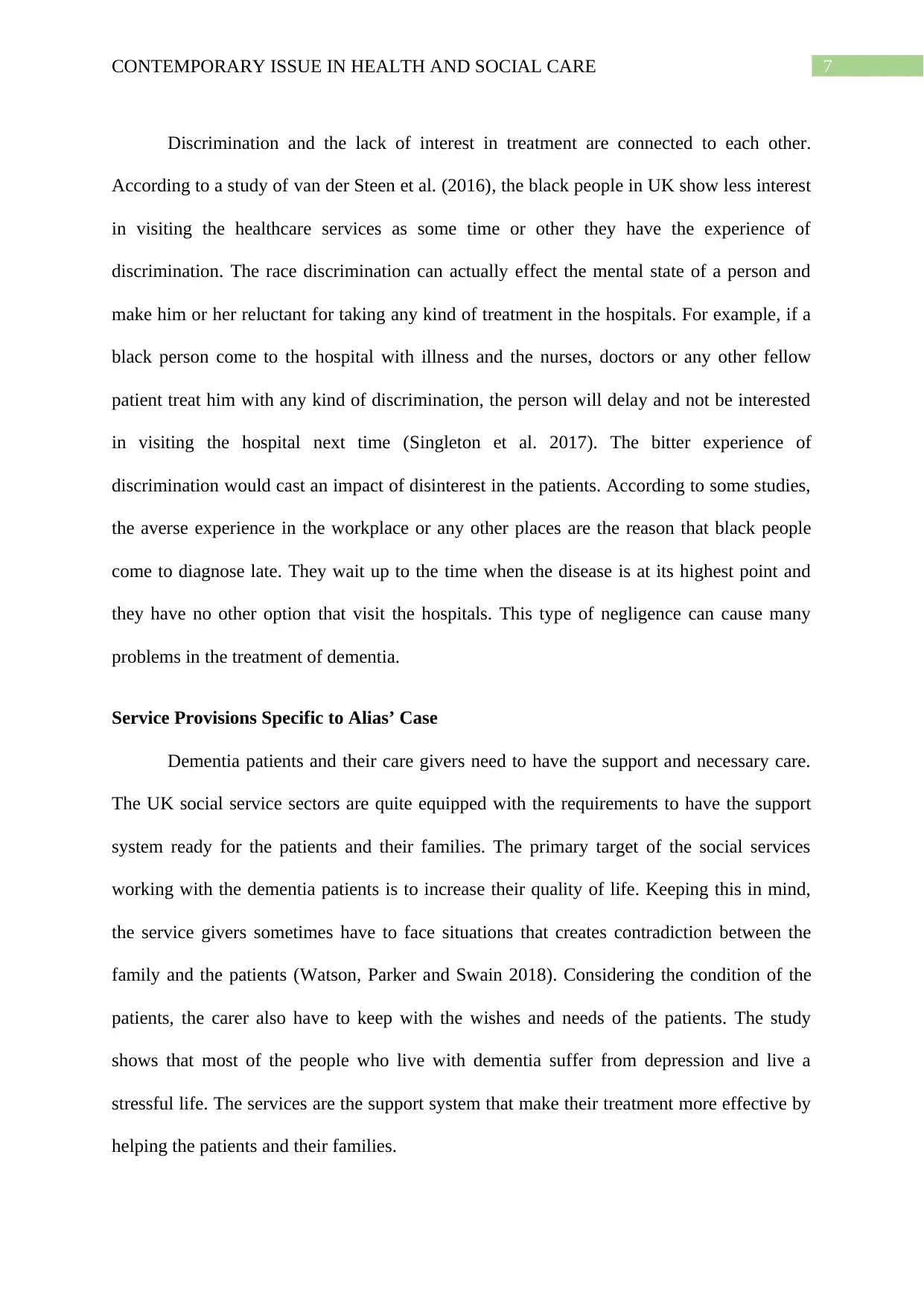
7CONTEMPORARY ISSUE IN HEALTH AND SOCIAL CARE
Discrimination and the lack of interest in treatment are connected to each other.
According to a study of van der Steen et al. (2016), the black people in UK show less interest
in visiting the healthcare services as some time or other they have the experience of
discrimination. The race discrimination can actually effect the mental state of a person and
make him or her reluctant for taking any kind of treatment in the hospitals. For example, if a
black person come to the hospital with illness and the nurses, doctors or any other fellow
patient treat him with any kind of discrimination, the person will delay and not be interested
in visiting the hospital next time (Singleton et al. 2017). The bitter experience of
discrimination would cast an impact of disinterest in the patients. According to some studies,
the averse experience in the workplace or any other places are the reason that black people
come to diagnose late. They wait up to the time when the disease is at its highest point and
they have no other option that visit the hospitals. This type of negligence can cause many
problems in the treatment of dementia.
Service Provisions Specific to Alias’ Case
Dementia patients and their care givers need to have the support and necessary care.
The UK social service sectors are quite equipped with the requirements to have the support
system ready for the patients and their families. The primary target of the social services
working with the dementia patients is to increase their quality of life. Keeping this in mind,
the service givers sometimes have to face situations that creates contradiction between the
family and the patients (Watson, Parker and Swain 2018). Considering the condition of the
patients, the carer also have to keep with the wishes and needs of the patients. The study
shows that most of the people who live with dementia suffer from depression and live a
stressful life. The services are the support system that make their treatment more effective by
helping the patients and their families.
Discrimination and the lack of interest in treatment are connected to each other.
According to a study of van der Steen et al. (2016), the black people in UK show less interest
in visiting the healthcare services as some time or other they have the experience of
discrimination. The race discrimination can actually effect the mental state of a person and
make him or her reluctant for taking any kind of treatment in the hospitals. For example, if a
black person come to the hospital with illness and the nurses, doctors or any other fellow
patient treat him with any kind of discrimination, the person will delay and not be interested
in visiting the hospital next time (Singleton et al. 2017). The bitter experience of
discrimination would cast an impact of disinterest in the patients. According to some studies,
the averse experience in the workplace or any other places are the reason that black people
come to diagnose late. They wait up to the time when the disease is at its highest point and
they have no other option that visit the hospitals. This type of negligence can cause many
problems in the treatment of dementia.
Service Provisions Specific to Alias’ Case
Dementia patients and their care givers need to have the support and necessary care.
The UK social service sectors are quite equipped with the requirements to have the support
system ready for the patients and their families. The primary target of the social services
working with the dementia patients is to increase their quality of life. Keeping this in mind,
the service givers sometimes have to face situations that creates contradiction between the
family and the patients (Watson, Parker and Swain 2018). Considering the condition of the
patients, the carer also have to keep with the wishes and needs of the patients. The study
shows that most of the people who live with dementia suffer from depression and live a
stressful life. The services are the support system that make their treatment more effective by
helping the patients and their families.
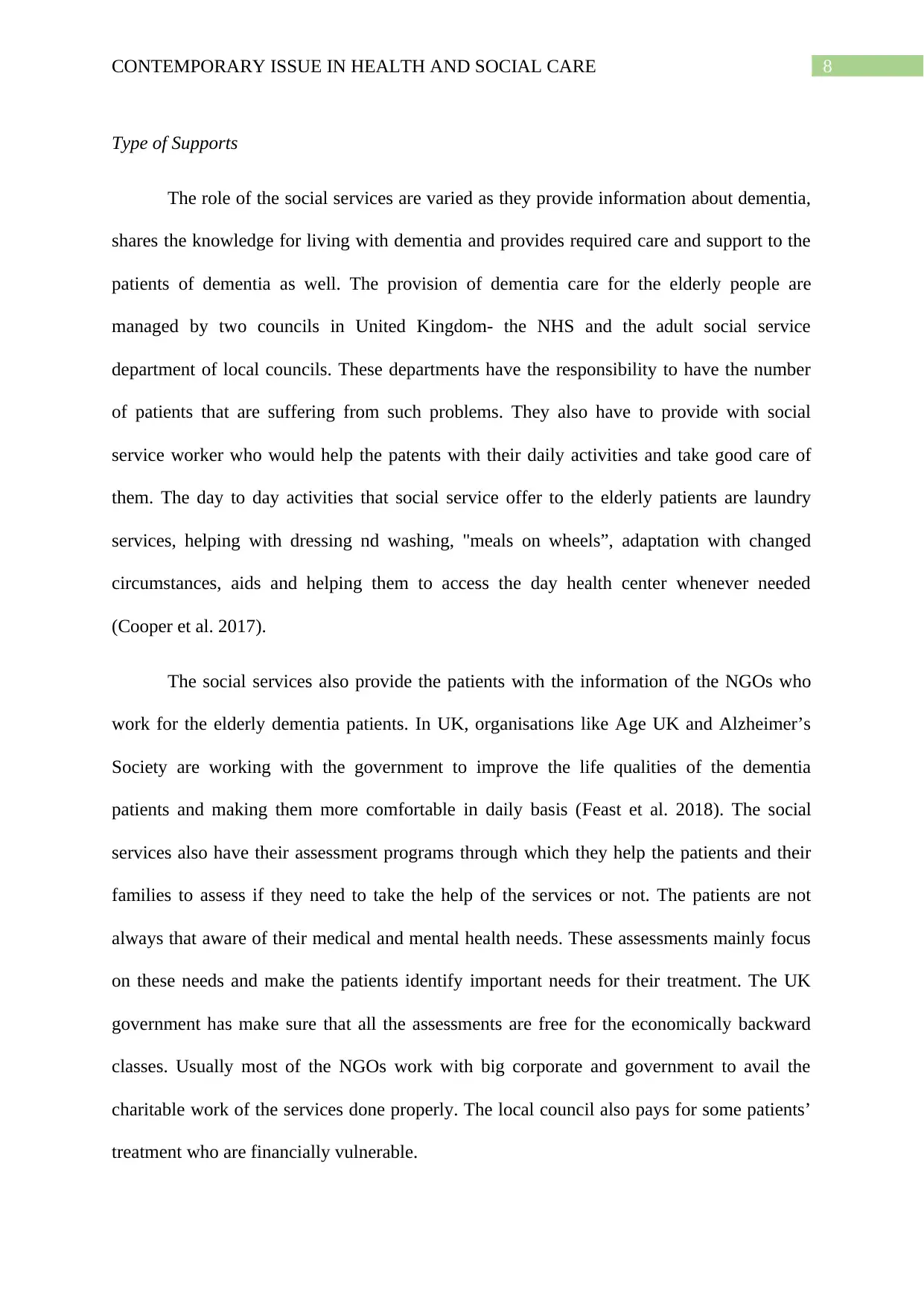
8CONTEMPORARY ISSUE IN HEALTH AND SOCIAL CARE
Type of Supports
The role of the social services are varied as they provide information about dementia,
shares the knowledge for living with dementia and provides required care and support to the
patients of dementia as well. The provision of dementia care for the elderly people are
managed by two councils in United Kingdom- the NHS and the adult social service
department of local councils. These departments have the responsibility to have the number
of patients that are suffering from such problems. They also have to provide with social
service worker who would help the patents with their daily activities and take good care of
them. The day to day activities that social service offer to the elderly patients are laundry
services, helping with dressing nd washing, "meals on wheels”, adaptation with changed
circumstances, aids and helping them to access the day health center whenever needed
(Cooper et al. 2017).
The social services also provide the patients with the information of the NGOs who
work for the elderly dementia patients. In UK, organisations like Age UK and Alzheimer’s
Society are working with the government to improve the life qualities of the dementia
patients and making them more comfortable in daily basis (Feast et al. 2018). The social
services also have their assessment programs through which they help the patients and their
families to assess if they need to take the help of the services or not. The patients are not
always that aware of their medical and mental health needs. These assessments mainly focus
on these needs and make the patients identify important needs for their treatment. The UK
government has make sure that all the assessments are free for the economically backward
classes. Usually most of the NGOs work with big corporate and government to avail the
charitable work of the services done properly. The local council also pays for some patients’
treatment who are financially vulnerable.
Type of Supports
The role of the social services are varied as they provide information about dementia,
shares the knowledge for living with dementia and provides required care and support to the
patients of dementia as well. The provision of dementia care for the elderly people are
managed by two councils in United Kingdom- the NHS and the adult social service
department of local councils. These departments have the responsibility to have the number
of patients that are suffering from such problems. They also have to provide with social
service worker who would help the patents with their daily activities and take good care of
them. The day to day activities that social service offer to the elderly patients are laundry
services, helping with dressing nd washing, "meals on wheels”, adaptation with changed
circumstances, aids and helping them to access the day health center whenever needed
(Cooper et al. 2017).
The social services also provide the patients with the information of the NGOs who
work for the elderly dementia patients. In UK, organisations like Age UK and Alzheimer’s
Society are working with the government to improve the life qualities of the dementia
patients and making them more comfortable in daily basis (Feast et al. 2018). The social
services also have their assessment programs through which they help the patients and their
families to assess if they need to take the help of the services or not. The patients are not
always that aware of their medical and mental health needs. These assessments mainly focus
on these needs and make the patients identify important needs for their treatment. The UK
government has make sure that all the assessments are free for the economically backward
classes. Usually most of the NGOs work with big corporate and government to avail the
charitable work of the services done properly. The local council also pays for some patients’
treatment who are financially vulnerable.
⊘ This is a preview!⊘
Do you want full access?
Subscribe today to unlock all pages.

Trusted by 1+ million students worldwide

9CONTEMPORARY ISSUE IN HEALTH AND SOCIAL CARE
Support of NHS
National Health Services or NHS is the service provider body that works under the
UK government. This body is responsible for the healthcare issues of the country and
treatment issues as well. In the case of Dementia, the NHS helps the patients to get treatment
from the hospitals (Blakemore et al. 2018). The services also take care of other problems in
the dementia patients like hearing care, physiotherapy, speech and language therapy and
metal acre support. The charity organisation- Dementia UK works with partnership with
Admiral Nurses in some part of UK. The training of the admiral nurses are also done by the
NHS and they are trained to give emotional and medical support to the dementia patients. The
services of the admiral nurses are found to be quite effective for the life quality improvement
of the elderly dementia patients.
Continuing Healthcare of the NHS
The continuing healthcare provisions are the part of NHS-funded nursing care. The
services are meant for the economically backward people whose cost of treatment would be
bore by the NHS. These initiatives are proving effective for the increased number of black
dementia patients. Continuing with the health care system and habits are the integral part of
dementia care (Feast et al. 2018). Each and every patient need to be followed up properly and
they need to have all the medical and metal heath support to continue their healthcare
services. The websites of NHS are full of the information of such assessments and services
supports. The patients of dementia can get all kinds of support through the service provision
irrespective of their gender, race or ethnicity.
Policy Practices, Care delivery Structures Specific to Alias’ Case
Examining the policies and practice in the care delivery system of dementia patients
focus on the risk reduction of the patients. The early detection of the Alzheimer’s disease and
Support of NHS
National Health Services or NHS is the service provider body that works under the
UK government. This body is responsible for the healthcare issues of the country and
treatment issues as well. In the case of Dementia, the NHS helps the patients to get treatment
from the hospitals (Blakemore et al. 2018). The services also take care of other problems in
the dementia patients like hearing care, physiotherapy, speech and language therapy and
metal acre support. The charity organisation- Dementia UK works with partnership with
Admiral Nurses in some part of UK. The training of the admiral nurses are also done by the
NHS and they are trained to give emotional and medical support to the dementia patients. The
services of the admiral nurses are found to be quite effective for the life quality improvement
of the elderly dementia patients.
Continuing Healthcare of the NHS
The continuing healthcare provisions are the part of NHS-funded nursing care. The
services are meant for the economically backward people whose cost of treatment would be
bore by the NHS. These initiatives are proving effective for the increased number of black
dementia patients. Continuing with the health care system and habits are the integral part of
dementia care (Feast et al. 2018). Each and every patient need to be followed up properly and
they need to have all the medical and metal heath support to continue their healthcare
services. The websites of NHS are full of the information of such assessments and services
supports. The patients of dementia can get all kinds of support through the service provision
irrespective of their gender, race or ethnicity.
Policy Practices, Care delivery Structures Specific to Alias’ Case
Examining the policies and practice in the care delivery system of dementia patients
focus on the risk reduction of the patients. The early detection of the Alzheimer’s disease and
Paraphrase This Document
Need a fresh take? Get an instant paraphrase of this document with our AI Paraphraser
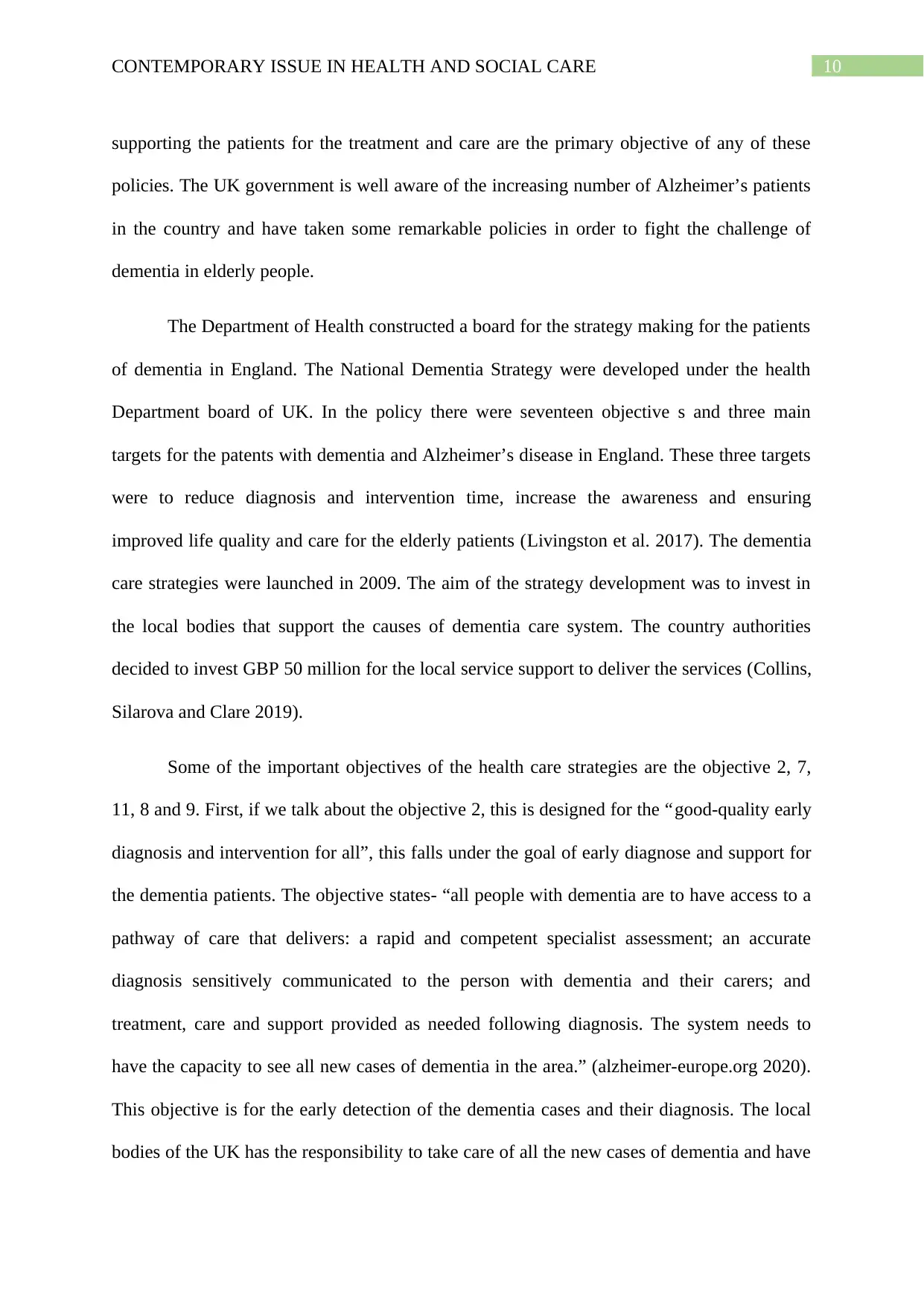
10CONTEMPORARY ISSUE IN HEALTH AND SOCIAL CARE
supporting the patients for the treatment and care are the primary objective of any of these
policies. The UK government is well aware of the increasing number of Alzheimer’s patients
in the country and have taken some remarkable policies in order to fight the challenge of
dementia in elderly people.
The Department of Health constructed a board for the strategy making for the patients
of dementia in England. The National Dementia Strategy were developed under the health
Department board of UK. In the policy there were seventeen objective s and three main
targets for the patents with dementia and Alzheimer’s disease in England. These three targets
were to reduce diagnosis and intervention time, increase the awareness and ensuring
improved life quality and care for the elderly patients (Livingston et al. 2017). The dementia
care strategies were launched in 2009. The aim of the strategy development was to invest in
the local bodies that support the causes of dementia care system. The country authorities
decided to invest GBP 50 million for the local service support to deliver the services (Collins,
Silarova and Clare 2019).
Some of the important objectives of the health care strategies are the objective 2, 7,
11, 8 and 9. First, if we talk about the objective 2, this is designed for the “good-quality early
diagnosis and intervention for all”, this falls under the goal of early diagnose and support for
the dementia patients. The objective states- “all people with dementia are to have access to a
pathway of care that delivers: a rapid and competent specialist assessment; an accurate
diagnosis sensitively communicated to the person with dementia and their carers; and
treatment, care and support provided as needed following diagnosis. The system needs to
have the capacity to see all new cases of dementia in the area.” (alzheimer-europe.org 2020).
This objective is for the early detection of the dementia cases and their diagnosis. The local
bodies of the UK has the responsibility to take care of all the new cases of dementia and have
supporting the patients for the treatment and care are the primary objective of any of these
policies. The UK government is well aware of the increasing number of Alzheimer’s patients
in the country and have taken some remarkable policies in order to fight the challenge of
dementia in elderly people.
The Department of Health constructed a board for the strategy making for the patients
of dementia in England. The National Dementia Strategy were developed under the health
Department board of UK. In the policy there were seventeen objective s and three main
targets for the patents with dementia and Alzheimer’s disease in England. These three targets
were to reduce diagnosis and intervention time, increase the awareness and ensuring
improved life quality and care for the elderly patients (Livingston et al. 2017). The dementia
care strategies were launched in 2009. The aim of the strategy development was to invest in
the local bodies that support the causes of dementia care system. The country authorities
decided to invest GBP 50 million for the local service support to deliver the services (Collins,
Silarova and Clare 2019).
Some of the important objectives of the health care strategies are the objective 2, 7,
11, 8 and 9. First, if we talk about the objective 2, this is designed for the “good-quality early
diagnosis and intervention for all”, this falls under the goal of early diagnose and support for
the dementia patients. The objective states- “all people with dementia are to have access to a
pathway of care that delivers: a rapid and competent specialist assessment; an accurate
diagnosis sensitively communicated to the person with dementia and their carers; and
treatment, care and support provided as needed following diagnosis. The system needs to
have the capacity to see all new cases of dementia in the area.” (alzheimer-europe.org 2020).
This objective is for the early detection of the dementia cases and their diagnosis. The local
bodies of the UK has the responsibility to take care of all the new cases of dementia and have
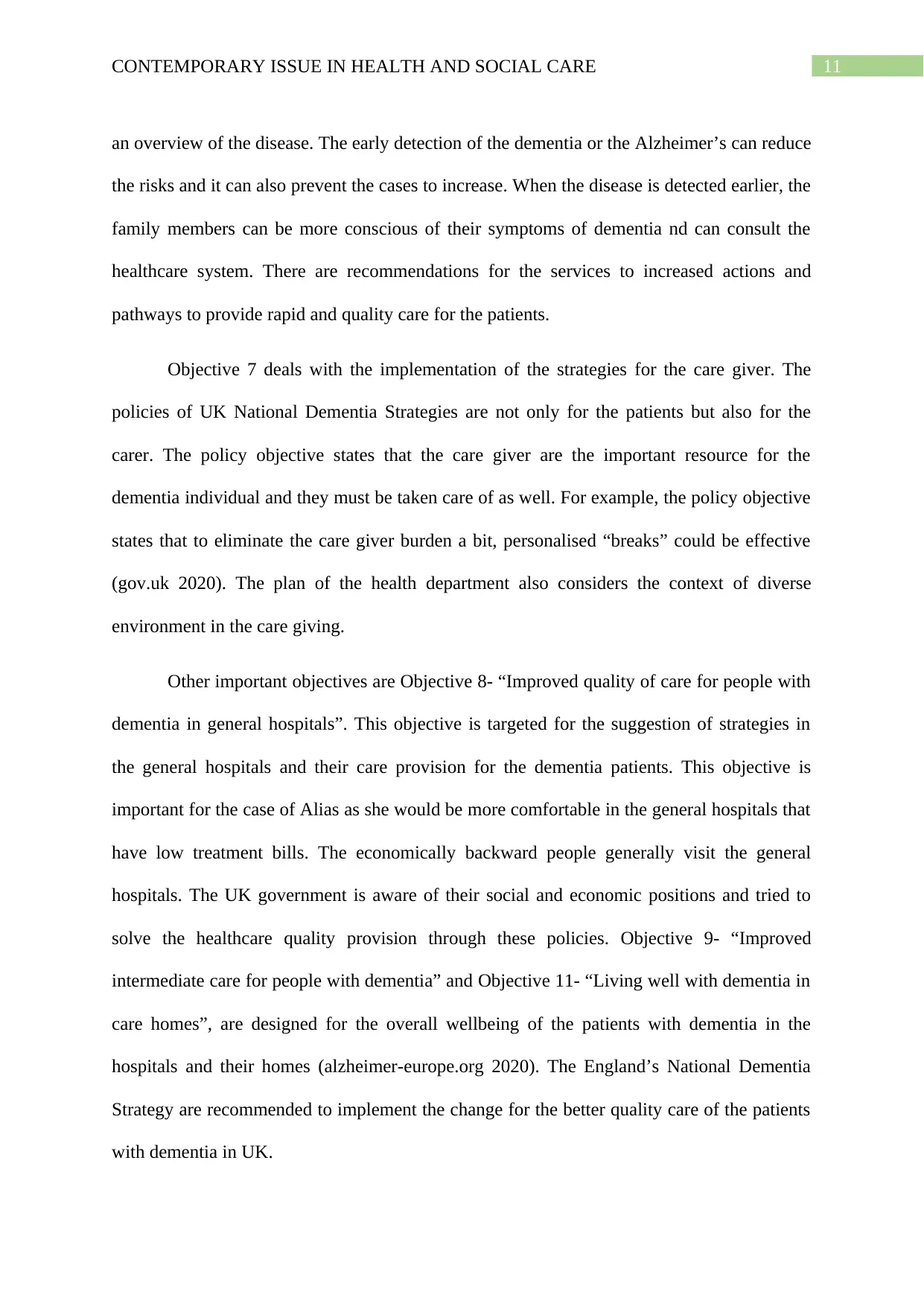
11CONTEMPORARY ISSUE IN HEALTH AND SOCIAL CARE
an overview of the disease. The early detection of the dementia or the Alzheimer’s can reduce
the risks and it can also prevent the cases to increase. When the disease is detected earlier, the
family members can be more conscious of their symptoms of dementia nd can consult the
healthcare system. There are recommendations for the services to increased actions and
pathways to provide rapid and quality care for the patients.
Objective 7 deals with the implementation of the strategies for the care giver. The
policies of UK National Dementia Strategies are not only for the patients but also for the
carer. The policy objective states that the care giver are the important resource for the
dementia individual and they must be taken care of as well. For example, the policy objective
states that to eliminate the care giver burden a bit, personalised “breaks” could be effective
(gov.uk 2020). The plan of the health department also considers the context of diverse
environment in the care giving.
Other important objectives are Objective 8- “Improved quality of care for people with
dementia in general hospitals”. This objective is targeted for the suggestion of strategies in
the general hospitals and their care provision for the dementia patients. This objective is
important for the case of Alias as she would be more comfortable in the general hospitals that
have low treatment bills. The economically backward people generally visit the general
hospitals. The UK government is aware of their social and economic positions and tried to
solve the healthcare quality provision through these policies. Objective 9- “Improved
intermediate care for people with dementia” and Objective 11- “Living well with dementia in
care homes”, are designed for the overall wellbeing of the patients with dementia in the
hospitals and their homes (alzheimer-europe.org 2020). The England’s National Dementia
Strategy are recommended to implement the change for the better quality care of the patients
with dementia in UK.
an overview of the disease. The early detection of the dementia or the Alzheimer’s can reduce
the risks and it can also prevent the cases to increase. When the disease is detected earlier, the
family members can be more conscious of their symptoms of dementia nd can consult the
healthcare system. There are recommendations for the services to increased actions and
pathways to provide rapid and quality care for the patients.
Objective 7 deals with the implementation of the strategies for the care giver. The
policies of UK National Dementia Strategies are not only for the patients but also for the
carer. The policy objective states that the care giver are the important resource for the
dementia individual and they must be taken care of as well. For example, the policy objective
states that to eliminate the care giver burden a bit, personalised “breaks” could be effective
(gov.uk 2020). The plan of the health department also considers the context of diverse
environment in the care giving.
Other important objectives are Objective 8- “Improved quality of care for people with
dementia in general hospitals”. This objective is targeted for the suggestion of strategies in
the general hospitals and their care provision for the dementia patients. This objective is
important for the case of Alias as she would be more comfortable in the general hospitals that
have low treatment bills. The economically backward people generally visit the general
hospitals. The UK government is aware of their social and economic positions and tried to
solve the healthcare quality provision through these policies. Objective 9- “Improved
intermediate care for people with dementia” and Objective 11- “Living well with dementia in
care homes”, are designed for the overall wellbeing of the patients with dementia in the
hospitals and their homes (alzheimer-europe.org 2020). The England’s National Dementia
Strategy are recommended to implement the change for the better quality care of the patients
with dementia in UK.
⊘ This is a preview!⊘
Do you want full access?
Subscribe today to unlock all pages.

Trusted by 1+ million students worldwide
1 out of 17
Related Documents
Your All-in-One AI-Powered Toolkit for Academic Success.
+13062052269
info@desklib.com
Available 24*7 on WhatsApp / Email
![[object Object]](/_next/static/media/star-bottom.7253800d.svg)
Unlock your academic potential
Copyright © 2020–2026 A2Z Services. All Rights Reserved. Developed and managed by ZUCOL.





